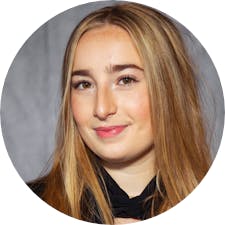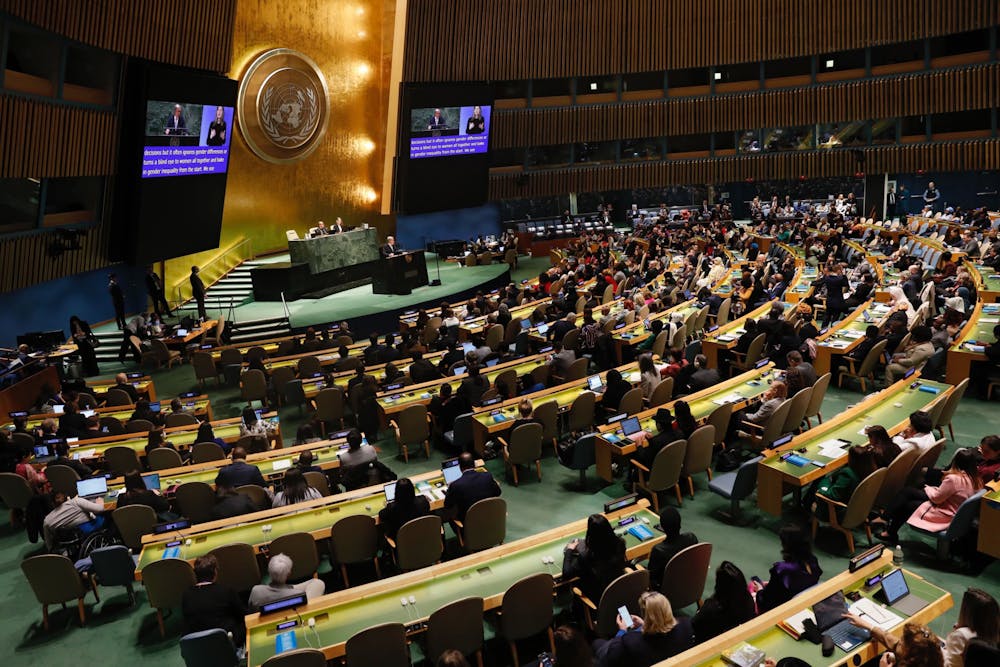Two Duke students were among the many participants at the United Nations’ 67th Session of the Commission on the Status of Women (CSW67) last month.
The CSW67 was held at the U.N. headquarters in New York from March 6-17. The commission acts as “the principal global intergovernmental body exclusively dedicated to the promotion of gender equality and the empowerment of women.” The theme of this year's session was “innovation and technological change, and education in the digital age for achieving gender equality and empowerment of all women and girls.”
Each year, the commission assembles to evaluate the progress of past programs and identify new goals. These new goals are then negotiated and agreed upon by all member states.
First-year Luna Abadía, a long-time activist and member of the Youth Advisory Board of Plan International USA, was appointed as a public delegate for the U.S. Delegation by the U.S. Department of State. Senior Mia Miranda, a WomenNC and Baldwin Scholar, presented her research on reproductive health and sexual health literacy at the commission.
After almost two weeks of intense negotiations, the CSW67 finally approved of agreed conclusions that, for the first time, included a paragraph dedicated to adolescent girls that Plan International, self-described as a “girls’ rights organization,” had drafted, according to Abadía. The paragraph “discusses the disproportionate discrimination and violence that adolescents face” from the use of technology.
“Plan International has done extensive research since 2007 on the issue of online harassment and abuse, and so part of my job was to convey that information to [the delegation],” Abadía said.
However, Abadía and Miranda say there were only a small number of young voices represented. Although Abadía had the opportunity to participate in the creation of the agreed conclusions, she said there were few other youth voices brought into consideration.
“That’s frustrating because you can have young people fly in from all around the world to engage with the mission, with a shared goal of wanting to make change, shape this policy and the work of the UN for the better,” Abadía said. “It can be really hard to access the actual spaces that are making change even when you’re already at the conference.”
But Abadía worked tirelessly throughout the days of negotiations to make sure youth voices were heard. She spent a lot of her time sitting behind the U.S. negotiator, advising her throughout the entire discussion to ensure that the concerns she had planned to bring into the conversation were heard and addressed.
“We really wanted to ensure that the [focus] is placed on the topic of online harassment and abuse that's occurring through social media,” Abadía said. “I was really hoping that I could secure language on platform accountability, on regulation of social media, of anything acknowledging the harms of harassment and the harms of technology.”
Although Abadía agrees that technology accessibility equity is an important goal, “it leaves out the nuance, the caveat, which is that we want to have good and safe and equitable technology in people's hands,” she said.
Alongside the advocacy organization WomenNC, Miranda presented her research findings at the CSW67’s U.N. commission parallel event “Novel Approaches to Ending Gender Disparity: Empowering Strategies from WomenNC.”
Miranda spent nine months conducting gender disparity research with a social scientist mentor from the Research Triangle Institute’s Global Gender Center. Her research specifically addressed reproductive and sexual health literacy among Latina immigrants in Durham.
“I was raised by Latino immigrants. And it's an issue that's very close to my heart, because I know how hard it is for them to receive sexual and reproductive health services and just the disparities that they face in that area,” Miranda said.
Throughout her research process, she spoke with members of the Durham community to inform her recommendations to be presented both in Durham and at the CSW.
“I think [my presentation] was something that would hopefully open people's eyes to the issues that might be faced, that might be going on in their own communities, and research that they could be doing in their own communities or groups that they could be helping,” Miranda said.
Get The Chronicle straight to your inbox
Signup for our weekly newsletter. Cancel at any time.

Audrey Patterson is a Trinity sophomore and local and national news editor of The Chronicle's 119th volume.

